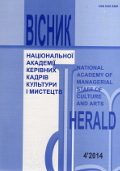ПСИХОЛОГІЧНІ ОСОБЛИВОСТІ ОРГАНІЗАЦІЇ СУЧАСНОГО ДОЗВІЛЛЄВОГО ПРОСТОРУ
Psychological characteristics of modern leisure space
Author(s): Oksana OliinykSubject(s): Anthropology, Education, Personality Psychology, Sociology of Culture
Published by: Національна академія керівних кадрів культури і мистецтв
Keywords: creativity; leisure; collective leisure; psychic activity; the stages of leisure measures;
Summary/Abstract: The article includes the theoretical analysis of creativity problem as a psychological feature of individual’s leisure space organization. The concept of creativity in modern domestic and foreign psychological science was revealed. The main types of creativity such as communicative, naive, cultural, talent one, self-actualization creativity were identified and characterized.On the basis of creativity nature researches of S. Taylor and E. Torrens there was defined a low probability model of individual differences in creativity. It was emphasized on the leading role of the environment in the development of creativity in the younger generation.The expediency of human creativity development was substantiated in the process of leisure that is carried out in a specific atmosphere of free choice, support and partnership, absence of competition, pleasure of the creative process and the result. It is indicated that creativity development optimization in the leisure activities is carried out under conditions of good public attention on the manifestation of human initiative to creative activity, social support of creative activities, development of adequate self-esteem personality, forming its inner motivation to creativity. It was generalized that defined conditions are conducive to the formation of a non-standard people's of different ages and social groups attitude to creative activity during leisure time.The analysis of the leisure concept in cultural studies and psychology is performed. According to the culturological approach the leisure is presented as a set of activities that perform restoring physical and mental strength of personality function. According to the psychological vision the leisure is defined as an indicator of human life, a source of comfort for the pleasure of its psychological needs. The preference was given to the personal choice freedom in leisure activities or activities considering its interests and preferences. The significance of leisure in the development of amateur performances, initiativeness, creative abilities and general person’s creativity was presented and characterized. There were defined social and psychological and cultural values of leisure, which lies in fulfilling the specific needs of the person only in the field of leisure. They are the need for creative activity, the need to attend cultural and leisure measures, perceiving works of art, reading books, watching TV shows.It was generalized, that the diversity of leisure activity forms for different social and age groups of the population determines the effectiveness of cultural development of our society and influences the mental activity of humans. In particular, it contribute the formation of a positive emotional people’s attitude to the participations in various types of leisure (organized, spontaneous and home leisure), the creation of relax and self-confidence atmosphere, the development of people’s interest to self-knowledge through self-revelation and creative self-expression, that is impossible to be made at home and at work, the activation of people’s awareness and acceptance of their own value, the development of adequate evaluation of their own abilities and capabilities skills, the development of communicative skills, overcoming the block of external and internal personality communication; formation of the ability to express their own emotional experiences associated with leisure activities and receive pleasure from its results.The relationship between different forms of individual’s mental activity and its personal qualities was actualized in the process of organizing of leisure activities. They are the emotions reinforce the logic of thinking operations, the promotion of their activation and occurrence of the interest to new leisure activities, the stimulation of the cognitive activity of cultural and leisure activities for understanding of their own image. The roles of leisure in the development of various forms of personal mental activity are the mental cognitive processes (feeling, perception, memory, thinking, imagination) and cognitive activity, the sphere of emotions and feelings; mental states (exaltation, inspiration), personality characteristics (abilities, traits, interests, motivation, harassments), self-esteem, value attitude toward themselves, positive image of themselves.It was indicated that highlighted psychological features of leisure are optimally implemented in individual and collective people’s leisure and contribute the development of motivation to participate in it. The choice of collective leisure forms was actualized under the following factors such as the group is a kind of unity that is able to provide optimal space and time for awareness, approbation and fixing various types and forms of leisure by its subjects. There were defined basic principles of groups functioning to ensure maximum effectiveness of creativity development and maximal collective leisure effectiveness: activity of participants, sociability, feedback, mutual trust, mutual respect, adequate self-revelation, subjecting of their statements, favorable psychological climate.It is outlined and described that the main stages of organized collective leisure activity realization are initial, main, final. The expediency of using psychological tricks and techniques at every stage of leisure was actualized. It is defined the leading role of animators, organizers and presenters and their psychological training importance in providing guidance and support to the participants of the collective leisure.
Journal: Вісник Національної академії керівних кадрів культури і мистецтв
- Issue Year: 2014
- Issue No: 4
- Page Range: 26-31
- Page Count: 6
- Language: Ukrainian

